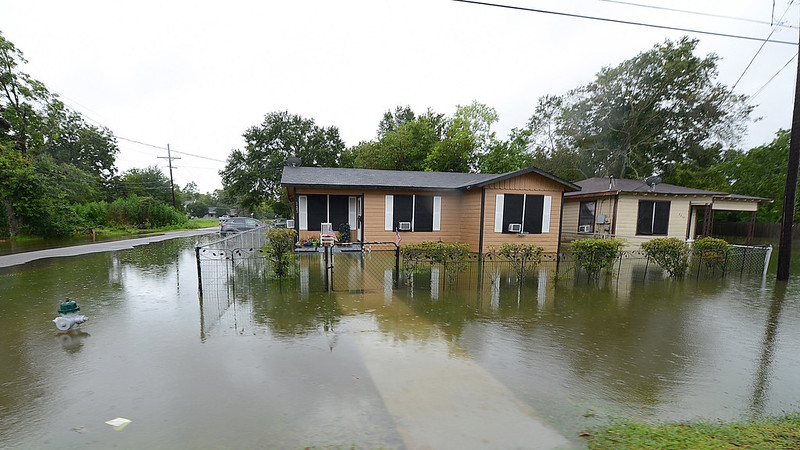Texas Universities Partner to Study Combined Impact of Flooding and Air Pollution in Beaumont-Port Arthur
September 15, 2022

Four Texas universities, led by The University of Texas at Austin, have been awarded a grant to establish a new research center to study the risks and impacts of flooding and air pollution in a fast-growing part of Southeast Texas. The scientists will focus on the interactions between these two key issues, as well as the potential acceleration of their effects by climate change.
Beaumont-Port Arthur, home to the world’s largest oil refinery and a major hub in the global energy sector, is a convergence zone for risks of flooding and air pollution. Researchers at Lamar University, Texas A&M University, Prairie View A&M University, and Oak Ridge National Laboratory (ORNL) in Tennessee will join UT Austin to operate the Southeast Texas Urban Integrated Field Lab (SETx-IFL). The U.S. Department of Energy awarded the team a $17 million grant for one of three field labs across the country.
“This partnership is a perfect example of the collective impact Texas universities can have by identifying and solving some of the greatest challenges in our home state,” said Jay Hartzell, president of UT Austin. “Beaumont-Port Arthur is critical to our state’s energy economy, and it is important for us to understand potential industry and climate effects on its growing population. I am proud that UT Austin is leading this effort with these esteemed university partners.”
The grant, significant in size for all of the university partners and the largest ever awarded to Lamar University, will build on a network of more than 100 community, industry and government stakeholders who have studied flooding in the region over the years. The SETx-IFL will help to extend research efforts and build capacity.
“This is welcome news for the people of Southeast Texas and the rest of our great state. The communities of Beaumont and Port Arthur have played a critical role in fueling both our state’s and nation’s economic successes, and our trajectory is not slowing down,” said Texas House Speaker Dade Phelan, a Beaumont native. “With that success, though, we must continue to prioritize the safety of people who call Southeast Texas home. This partnership will no doubt help achieve that through the new research center and talented team that includes researchers from our own Lamar University to spearhead these efforts.”
As part of the five-year project, researchers will collect data and develop simulation models focused on flooding impacts and air pollution under various climate scenarios. This is a novel approach because flooding and air pollution are rarely jointly examined in research.
“Air pollution is a chronic stressor for the community, and that is compounded when flooding strikes,” said Paola Passalacqua, an associate professor in the Cockrell School of Engineering at UT Austin and leader of the project. “During flooding events there can be major chemical releases into the air and the soil. For both flooding and air pollution, we lack information on what is going to happen under future climate scenarios and how to prepare for that.”
Geeta Persad, assistant professor in the Jackson School of Geosciences, will be leading development of climate change scenarios for the project. Her team will be developing an innovative, two-pronged approach to mapping climate vulnerability in Southeast Texas. They will be looking at climate change in the region from a top-down view—tailoring comprehensive global climate model datasets of future climate scenarios for the Beaumont-Port Arthur area—and a bottom-up view—leveraging an emerging method called “decision-scaling” that uses community-defined measures of resilience to map potential breaking points in local systems that could be created by climate change.
“Comprehensive climate change datasets that are tailored for a communityare a huge asset for local governments, utilities, and corporations trying to adapt to climate change, but very few cities, especially on the Texas Gulf Coast, have the resources or know-how to generate these datasets themselves,” said Persad.
At the same time, local knowledge can be critical for identifying the specific changes that will most impact a community, Persaid said. She hopes the two-pronged approach will create actionable climate data for Southeast Texas with long-term benefits that will reach beyond the scope of the project.
Researchers plan to examine how environmental hazards might disproportionately affect communities of color and will work with residents and community-based organizations to help communities adapt to future climate scenarios in equitable ways. The project also includes the development of educational resources to foster continued research and response to these threats, with an emphasis on diversity, equity and inclusion led by Liv Haselbach, professor at Lamar University, which is based in Beaumont.
The UT Austin team includes 10 faculty members and researchers from a variety of colleges, schools and departments. Pawel Misztal and Kerry Kinney in the Department of Civil, Architectural and Environmental Engineering will be conducting measurements as part fot the project’s air pollution efforts. Katherine Lieberknecht, assistant professor in the School of Architecture, is leading the co-design of mitigation solutions with the SETx-IFL communities. From the Cockrell School, Elena McDonald Buller, senior research engineer at the Center for Energy and Environmental Resources, will examine air quality impacts across the region, and Kasey Faust, associate professor in the Department of Civil, Architectural and Environmental Engineering, is part of the co-design group. Patrick Bixler, an assistant professor in the LBJ School of Public Affairs, is part of the equity group. Suzanne Pierce, research scientist at the Texas Advanced Computing Center, is leading the Knowledge Management Platform, which will allow researchers and stakeholders to access cybertools to support the project.
Michelle Meyer, associate professor at Texas A&M University, brings expertise in social sciences to lead the equity portion of the project with collaborators from Texas A&M and ORNL and Noel Estwick, an assistant professor at Prairie View A&M.
Another newly funded IFL led by Argonne National Laboratory will focus on the Chicago area and involves Dev Niyogi, a professor in the Jackson School of Geosciences and the Cockrell School of Engineering.
